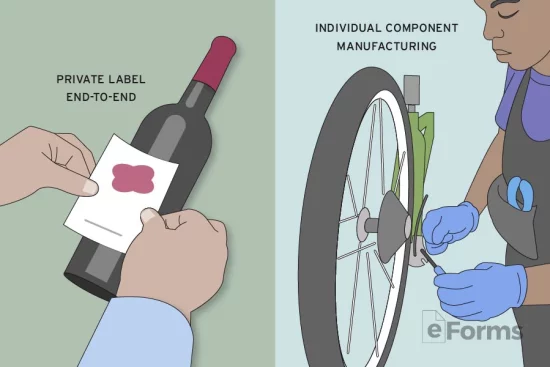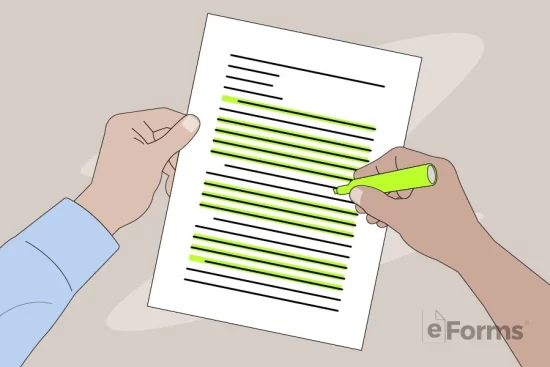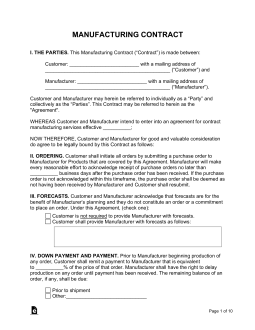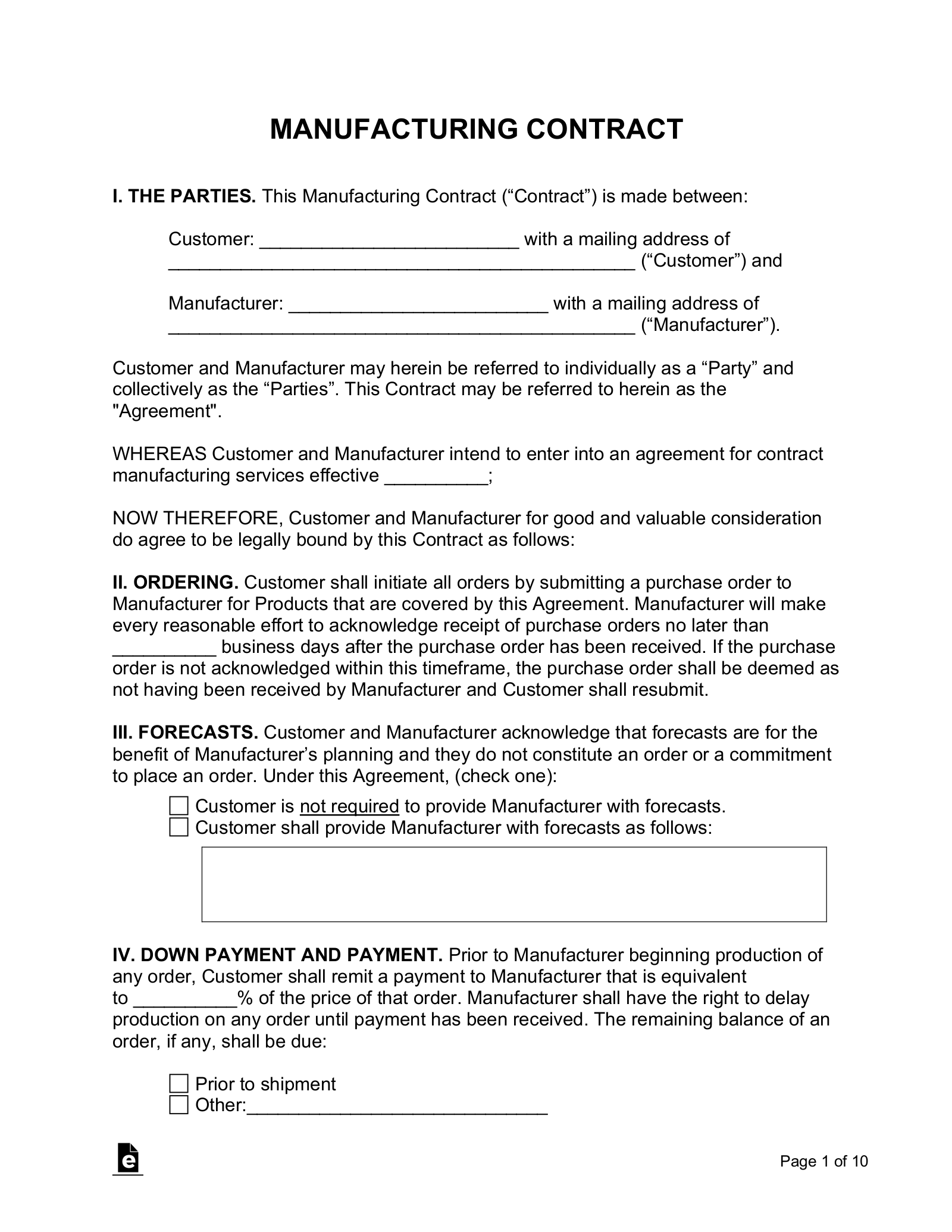Updated July 19, 2023
A manufacturing contract is a legally binding agreement between a manufacturer and a customer that outlines the terms and conditions of a manufacturing job. The contract will include a description of the product being manufactured, the timeline for its completion, the cost of the product, and any other relevant information.
Table of Contents |
What is Contract Manufacturing?
It’s common for businesses to sell products they don’t have the capacity to make. This means they have to establish and maintain relationships with manufacturers, which can be either in the same town or overseas.
Companies outsource and contract manufacturing for various reasons, including saving on costs, focusing on their core competencies, and concentrating their manufacturing where raw materials are readily available. The latest data published by the U.S. Bureau of Economic Analysis shows that manufacturing added value of more than 10% to the country’s GDP.
Types of Manufacturing

- Private label: A company contracts a manufacturer to make something, assemble its parts, and then deliver it to a warehouse or retail store. The third-party manufacturer is known, in the world of manufacturing, as a private label manufacturer.
- End-to-end: The manufacturer has some control over the product’s design. In private-label manufacturing, a client sends instructions and specifications to the manufacturer; in end-to-end manufacturing, the client invites the manufacturer’s feedback.
- Individual component: Manufacturers produce a single piece – an individual component – of a product, then send it to the contracting company, which handles the product’s assembly.
Industries
Below are some examples of industries in which manufacturing contracts are commonly used:
- Aerospace
- Defense
- Electronics
- Energy
- Automotives
- Pharmaceuticals
- Food
What to Include (13)

Manufacturing contracts are long and complex. Below are some common elements of manufacturing contracts.
1. Scope
A manufacturing contract should specify the family, class, line, type, and specifications of the product being manufactured.
2. Product Specifications

It’s important to be clear about the specifications of the product being ordered, as well as the size and quantity of the order.
3. Term
The contract should clarify the length of the contractual relationship. How long will the contractual relationship last? For the time it takes to fulfill a single order? Or will it be serial and regular? Will the contract be renewable, and if so, at what intervals? How will it be terminated?
4. Pricing
Make sure to factor in not only the cost of the product, but associated costs, such as shipping, taxes, duties, and tariffs.
5. Payment Terms
In determining payment terms, consider how payments will be accepted and by when they should be made. Should payment be made before the product gets made? Before it gets shipped? After it gets delivered? Also consider being specific about penalties for late payments, if any.
6. Samples
Should the manufacturer send a sample of the product order to the client before an entire shipment gets sent? A contract might state that the manufacturer has the discretion to require a customer to approve a product sample before fulfilling an entire order.
7. Delivery and Acceptance
The contract should outline how products will be packed, packaged, stored, and delivered, and when. It should also specify how many days the customer has to inspect and accept or reject the order.
8. Insurance
Will insurance be a requirement of the arrangement? Who pays for it? What happens if an entire shipment of products is damaged in the delivery process?
9. Returns
If the customer rejects the product order within the contractually allocated time period, then how will returns be handled? What are legitimate reasons to return a product or products? Who will pay for the costs associated with the return?
10. Recalls
If a product is recalled, meaning it’s discovered to be defective and dangerous and therefore a liability, then who’s responsible? A manufacturing contract should state what happens in this situation. Should this occur, will the manufacturer compensate the customer for the cost of the product, as well as shipping and insurance expenses?
11. Intellectual Property
A manufacturing contract should necessarily address intellectual property rights. When a third-party manufacturer is creating a product for a company with trademarked, patented, or copyrighted property, then the contract should outline how this will be managed. Will a private label manufacturer be able to reproduce a company’s logo, for example? In which instances? For how long?
12. Confidentiality
If the manufacturer gains access to a company’s information and data, such as design sketches and product prototypes, what are its legal obligations to the company? How should confidential information be treated and/or disposed of? How long should this confidentiality clause last? In perpetuity?
13. Indemnification
It’s usually a good idea to include, as part of any contract, an indemnification clause, which clarifies the terms of compensation in the event of harm or loss caused by the contract. What happens, for example, if the product is a commercial flop? That’s not the manufacturer’s fault, per se, so a manufacturing contract should address indemnity.
Sample
Download: PDF, MS Word, OpenDocument
MANUFACTURING CONTRACT
I. THE PARTIES. This Manufacturing Contract (“Contract”) is made between:
Customer: [CUSTOMER’S NAME] and
Manufacturer: [MANUFACTURER’S NAME].
II. ORDERING. Customer shall initiate all orders by submitting a purchase order to Manufacturer for Products that are covered by this Agreement. Manufacturer will make every reasonable effort to acknowledge receipt of purchase orders no later than [# OF DAYS] business days after the purchase order has been received.
III. FORECASTS. Under this Agreement, (check one):
☐ Customer is not required to provide Manufacturer with forecasts.
☐ Customer shall provide Manufacturer with forecasts.
IV. DOWN PAYMENT AND PAYMENT. Prior to Manufacturer beginning production of any order, Customer shall remit a payment to Manufacturer that is equivalent to [PERCENT]% of the price of that order. The remaining balance of an order, if any, shall be due:
☐ Prior to shipment
☐ Other: [DETAILS]
V. DELIVERY AND ACCEPTANCE. Products shall be shipped from Manufacturer’s facility at [ORIGIN OF SHIPMENTS (FOB)] by or before the agreed-upon shipping date, and will be packed, packaged, crated, stored, and marked so as to ensure safe delivery in compliance with all regulations of the carrier(s) and any governing authorities.
VI. LATE DELIVERY. Time being of the essence, if Manufacturer fails to deliver the Products in accordance with Paragraph V, and fails to cure such delay for 5 business days after the issue of written notice by Customer, Customer may elect to do any of the following:
☐ approve a revised delivery date or time;
☐ require expedited or premium shipment of the late delivery at Manufacturer’s expense;
☐ cancel the applicable order.
VII. INSURANCE. Shipments from Manufacturer to Customer (select one):
☐ are not required to be insured.
☐ shall be insured by the Customer.
☐ shall be insured by the Manufacturer.
VIII. WARRANTY. Manufacturer warrants to Customer that upon the date of delivery, and for a period of [# OF] (select one): ☐ days ☐ weeks ☐ months thereafter, Products will remain free from defects and will conform to the tolerances and specifications set forth herein.
IX. CHANGES. Neither Party may make changes to a Product’s specifications except as set forth in this Provision.
X. REPRESENTATIONS. Customer warrants that the manufacture of Products pursuant to this Agreement does not, or will not, to the best of Customer’s knowledge, constitute any infringement whatsoever upon the intellectual property rights of any third party.
XI. SCOPE. Manufacturer will manufacture, for the Customer, Products of the family, class, line, and type, as ordered by Customer, to the tolerances and within the specifications herein defined.
XII. TERM. The term of this Agreement shall commence on the date first written above and shall automatically renew on each anniversary of the Effective Date unless terminated by one Party.
XIII. TERMINATION. Termination, Generally. Parties shall have the right to terminate this Contract at any time 1) for any material breach that remains uncured for at least 30 days after a Party provides written notice of such breach; 2) by mutual agreement, having been put in writing and attached hereto as an amendment; or 3) upon written notice provided to the other Party no fewer than 30 days prior to an anniversary of the Term.
XIV. NO CREDIT TERMS. No part of this Agreement may be so construed as to establish credit terms or a credit arrangement by or between Manufacturer and Customer.
XV. PRODUCTS. Products to be manufactured for Customer under this Agreement shall be documented in “Exhibit A: Products”.
XVI. PRICING. Prices shall be documented in “Exhibit B: Pricing”, shall be in US Dollars, and shall detail any costs that are excluded from prices (i.e. shipping, sales or use tax, duties, tariffs, etc.).
XVII. SAMPLE FOR APPROVAL. Manufacturer may, at its discretion, require Customer to approve a sample of any Product before putting it into regular production.
XVIII. QUALITY. Manufacturer shall obtain and maintain all necessary registrations, licenses, and approvals required to manufacture, for Customer, Products covered by this Agreement.
XIX. OBSOLETE AND EXCESS INVENTORY. To the extent that Manufacturer makes or obtains components or materials in quantities based on Customer forecasts; if such components or materials should remain unused 1) upon the end-of-life of any Product they are specific to, or 2) upon termination of this Agreement, whichever shall occur first, Customer shall be obligated to compensate Manufacturer for their actual cost plus a reasonable markup except for those components that are in excess or have been made obsolete as a result of Manufacturer’s failure to deliver under Paragraph VI.
XX. DISPUTE RESOLUTION. Any dispute, controversy, or claim arising from or relating to this Agreement, or the breach, termination, or invalidity hereof, shall be submitted for negotiation and resolution to the Manufacturer and Customer, by delivery of written notice from either of the Parties to the other Party.
XXII. INTELLECTUAL PROPERTY LICENSE. Customer hereby grants Manufacturer a non-exclusive, non-transferable license to use, produce, or reproduce Customer trademarked, patented, or copyrighted works for the term of this Agreement solely for the purpose of allowing Manufacturer to perform its obligations hereunder.
XXIII. PRODUCT RECALLS. Customer shall be solely responsible for, and obligated to remedy, any recall whether voluntary or involuntary, that occurs for any reason.
XXIV. CONFIDENTIAL INFORMATION. The obligations of the Parties shall be to always hold and maintain the Confidential Information in the strictest of confidence and to their agents, employees, representatives, affiliates, and any other individual or entity that is on a “need to know” basis.
XXV. FORCE MAJEURE. Any delay of either Party’s performance under this Agreement due to unforeseeable events beyond their control (including but not limited to riots, war, flood, famine, terrorist attacks, pandemics, severe weather, and earthquakes) shall not constitute a breach hereunder.
XXVI. RELATIONSHIP OF PARTIES. Manufacturer and Customer are independent contractors for the purpose of this Agreement.
XXVII. SEVERABILITY. If any provision of this Agreement is held or made invalid or unenforceable by a court decision, statute, or rule, or shall be otherwise rendered invalid, the remainder of this Agreement shall not be rendered invalid thereby.
IN WITNESS WHEREOF, the Parties have caused this Agreement to be executed as of the day and year first written above.
__________________
Customer Signature
__________________
Printed Name and Date
__________________
Manufacturer Signature
__________________
Printed Name and Date


